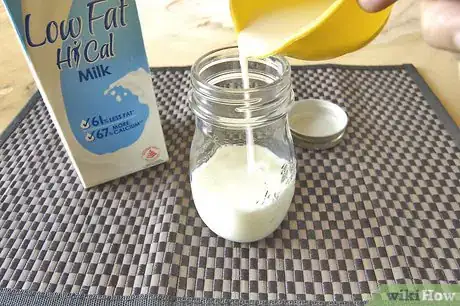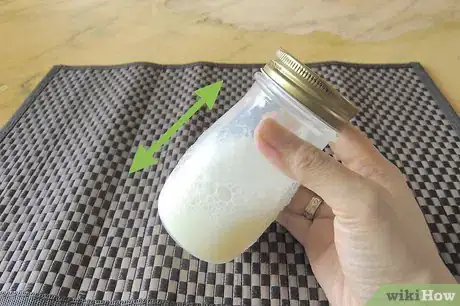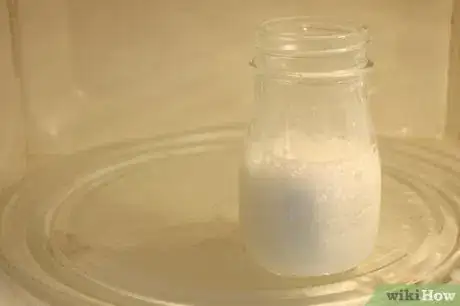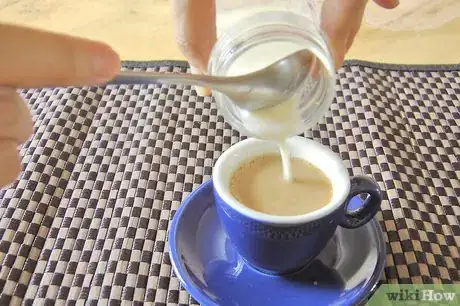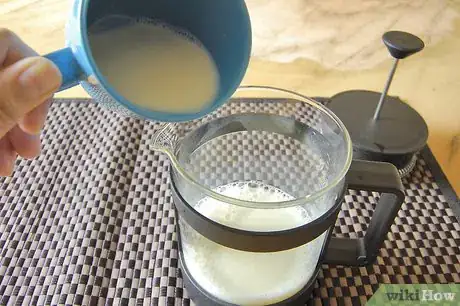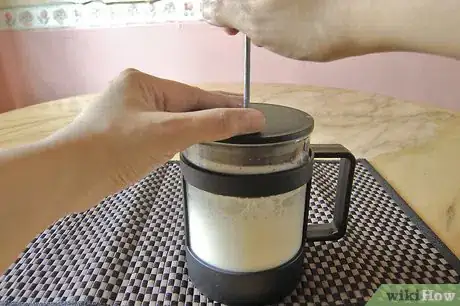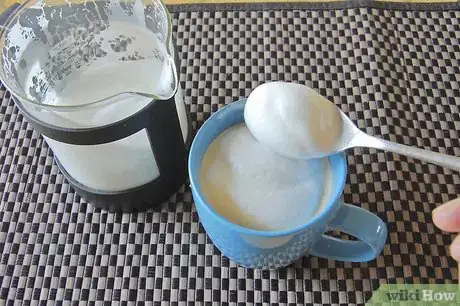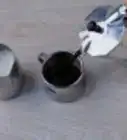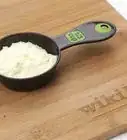X
This article was co-authored by wikiHow Staff. Our trained team of editors and researchers validate articles for accuracy and comprehensiveness. wikiHow's Content Management Team carefully monitors the work from our editorial staff to ensure that each article is backed by trusted research and meets our high quality standards.
This article has been viewed 107,941 times.
Learn more...
Want to get that same frothy texture in your homemade espresso as you get at a coffee shop? You can achieve the same effect by frothing milk with a jar, a coffee press, or a handheld milk frother—no need for an espresso machine or other fancy equipment!
Steps
Method 1
Method 1 of 3:
Using a Jar
-
1Pour milk into a jar. Pour your desired amount of milk into a glass jar that has a tight-fitting lid. Use 2% or nonfat milk for the best foam.[1]
- Use any size glass jar, but make sure your milk fills no more than half of it, as it will take up more space when frothed.
-
2Put on the lid and shake. Screw on the jar lid tightly and shake the jar as hard as you can for 30 to 60 seconds. It should look frothy and approximately doubled in volume.Advertisement
-
3Microwave for 30 seconds. Take off the lid and put the jar into the microwave for 30 seconds to set the foam and make it warm for adding to your espresso.
-
4Add the milk foam to your espresso. Use a spoon to hold back the foam at first, allowing the portion of the milk that is still liquid to pour into your espresso. Then spoon the thicker milk foam on top of your espresso and milk.[2]
- For a cappuccino, you want about the same amount of warm milk as milk foam added to the espresso, and for a latte, you want twice the amount of warm milk as milk foam. To achieve this, you may need to warm up more milk in the microwave to get the right amount.[3]
Advertisement
Method 2
Method 2 of 3:
Using a Coffee Press
-
1Heat 2% or nonfat milk. Pour your desired amount of milk into a microwave-safe glass or mug and heat in the microwave for 45 seconds.
-
2Pour heated milk into a coffee press. Use a coffee press, also called a French press, that has a glass container and a plunger. Pour the milk you heated into the glass container.
-
3Pump the milk in the press. Use the plunger of the coffee press to press up and down through the milk in the container repeatedly until it looks frothy and approximately double its original volume.
-
4Add the milk foam to your espresso. Pour the milk foam into your espresso, using a spoon to hold back the thicker foam to allow the liquid milk to pour out first. Then spoon the foam on top of your milk and espresso.[4]
- For a cappuccino, use about the same amount of warm liquid milk as milk foam to add to your espresso. For a latte, use about twice the amount of liquid milk as milk foam. To achieve this, you may need to warm up more milk in the microwave to get the right amount.[5]
Advertisement
Method 3
Method 3 of 3:
Using a Milk Frother
-
1Pour milk into a glass or mug. Whichever glass or mug you use, don’t fill it more than half full with milk, and make sure the glass or mug is microwave-safe. Use 2% or nonfat milk for best results.
-
2Use a handheld milk frother. Locate a small electric or battery-powered milk frother that you can hold inside your glass of milk. Place your milk frother into the milk so that the whisk end is submerged in the milk before turning it on.
-
3Froth the milk. Switch the milk frother on and gently move it up and down in the milk for about 30 seconds until the milk appears frothy and approximately double the volume.
-
4Heat the milk foam. Put your glass or mug with the frothed milk into the microwave and heat for 30 to 45 seconds.
-
5Combine milk foam and espresso. Add your espresso straight to your mug of frothed milk foam, or pour the milk foam over another cup with espresso, using a spoon to hold back the foam and let the liquid milk pour it, then spooning the foam on top.[6]
- For a cappuccino, use about the same amount of warm liquid milk as milk foam to add to your espresso. For a latte, use about twice the amount of liquid milk as milk foam. To achieve this, you may need to warm up more milk in the microwave to get the right amount.[7]
-
6Finished.
Advertisement
Community Q&A
-
QuestionWhen do I add sugar?
 Community AnswerThere isn't a certain time to add sugar. You can do it after you add creamer or even before.
Community AnswerThere isn't a certain time to add sugar. You can do it after you add creamer or even before. -
QuestionCan I use the froth to make designs?
 Community AnswerYes, you can certainly do this. As long as there is a small amount of foam/froth on your steamed milk, you can use it to make all kinds of latte art. A small "spout" on your steaming mug or other container will make it easier to control the flow of milk, so try using a measuring cup with a spout.
Community AnswerYes, you can certainly do this. As long as there is a small amount of foam/froth on your steamed milk, you can use it to make all kinds of latte art. A small "spout" on your steaming mug or other container will make it easier to control the flow of milk, so try using a measuring cup with a spout.
Advertisement
Warnings
- Don’t let milk foam sit for too long or it will dissolve. Have your coffee made and ready before frothing milk, and then add the milk foam to it right away.⧼thumbs_response⧽
Advertisement
Things You’ll Need
- 2% or nonfat milk
- Microwave
- Microwave-safe glass or mug
- Glass jar with lid, coffee press, or handheld milk frother
- Spoon
References
- ↑ http://www.capresso.com/media/wysiwyg/How_to_Achieve_the_Perfect_Frothed_Milk_1.pdf
- ↑ https://www.thekitchn.com/how-to-froth-milk-for-cappuccinos-in-the-microwave-cooking-lessons-from-the-kitchn-100716
- ↑ http://lokeshdhakar.com/coffee-drinks-illustrated/
- ↑ http://honestcooking.com/how-to-make-milk-foam-without-frother/
- ↑ http://lokeshdhakar.com/coffee-drinks-illustrated/
- ↑ http://lifehacker.com/5894435/fake-a-latte-using-a-milk-frother-and-your-microwave
- ↑ http://lokeshdhakar.com/coffee-drinks-illustrated/
About This Article
Advertisement
